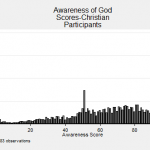For reasons that I don’t fully understand, I seem to be getting older every year; in fact, if memory serves, I have yet another birthday coming in the next twelve months. Part of aging for me, and I suppose everyone else, involves reflecting on how I’m changing with age. Of course there are the usual things—knee pain, graying hair, and the accumulation of millions of dollars, but in addition, my prioritization in day-to-day life is changing.
Specifically, I’m becoming more aware of the opportunity costs of what I think and do. Opportunity costs, as I understand them, regard what you are not able to do when you chose a course of action. For example, if a student goes to the bar on a Friday night then on of the opportunity costs is that they are not spending the time studying.
I’ve known the concept of opportunity costs since Econ 1A back in college, but how I’m becoming much more aware of it. As I approach my fiftieth birthday in October (gift registry information to come), somewhere deep inside of me a little voice is letting me know that I have a limited number of work days and evenings and sunny weekends left, so I should probably be careful about how I use them.
My heightened awareness of these costs comes through at different times. Earlier this week, during a summer school class, a student mentioned a recent murder case in which the assailant apparently started to bite into the victim (the “zombie killer”?—don’t care enough to look it up), and several other students excitedly chimed in with what they knew or thought about the case. My first reaction was something along the lines of, “that’s gross,” but my second reaction was thinking what a waste of brain space for anyone to think about, and yet it makes national news. Should we spend our time thinking about such a deed when there are things of beauty or need or promise in their own lives?
Over the past 5-7 years, I have cut back on my television watching such that now we don’t get regular stations (available here only by cable), and I watch maybe two or three episodes or movies a month, with the family, on Netflix. This simple action has freed up much mental and emotional space for things in life that I value more than participating in a rousing discussion of what happened on last night’s reality television show. When I do watch regular television, I’m come away wishing that I had that time back, but, even more so, surprised by how much time I spend thinking about it for the next day or two.
Basically, with age I am starting to be clearer in recognizing and enacting my priorities in life. Perhaps this is analogous to how I handle money. When I’m on a trip or am in some other situation where I have an initial sum of money to last me for a specified period of time, I am more of a spendthrift at the start—thinking that I have plenty—than at the end, when I’m much more careful in how I spend. So, my spending priorities sharpen as I have less money. Maybe same happens with life expectancy?
This probably underlies the transformative power of near-death experiences, where people realize that their days are numbered, so they had better get to what they want now before it’s too late. A friend of my extended family had a grave illness in his teens, and when he survived it against the odds, he decided that it was time to be a cowboy like he had always wanted to be. So, upon graduation, he moved from the East Coast out to Montana and set up shop as a rancher, a life situation that he enjoyed for several decades.
The irony, of course, is that we all have a limited number of days, it’s just our awareness of them that changes. I wish that I could have had a firmer grasp of this when I was younger, but maybe that’s not the nature of youth. Still, I’m glad that I’m getting it now while my knees can still get me around.











